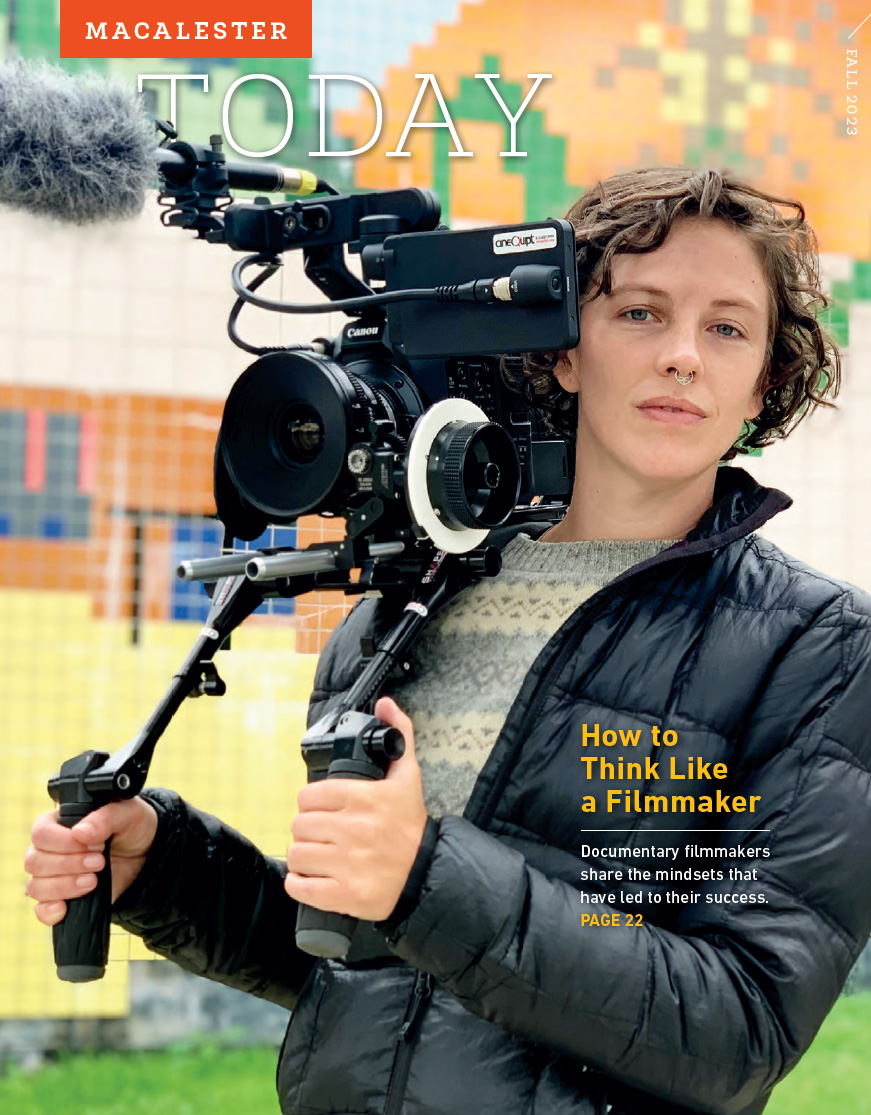
By Dawn Araujo-Hawkins / Photo by Chris Sztybel
Life for Sandolsam “Stone” Cha ’10 has been largely lived in liminal spaces. The son of a Christian mother and a humanist father, nine-year-old Cha’s world was redefined when his father announced that he was not only converting to Christianity, but also moving the family from South Korea to Holland, Michigan, so he could study to become a missionary.
Cha grew up following his father all over the globe—the Netherlands, the archipelago of Vanuatu, New Zealand, and a few stints back in Korea. He applied to Macalester because it had a higher percentage of international students than any other college he could find. After graduating with a degree in biology, Cha made the US his permanent home. But he continues to seek out the between-ness of things.
“I feel like I’m doing it right when both ends of the spectrum of Christianity don’t like me,” he says, sitting in his home, the silver cross hanging from a chain around his neck glittering occasionally in the light.
Cha’s full-time job is providing medication and procedural abortions at a local clinic. A few weekends a month, the father of two works as an OB-GYN delivering babies at a community hospital. Once a week, he’s in online seminary classes working toward a master’s degree in theology. His dream is to one day, when his kids are older, earn a doctoral degree and do scholarly work around reproductive justice through feminist and womanist lenses.
There are already theologians doing that work, he notes. “But I hope to contribute to that conversation as an OB-GYN seeing patients day to day,” he says.
Cha’s theology leans relatively conservative (he believes, for instance, that the exclusive, salvific narrative of the cross is “the truth with a capital T”) but his application of that theology to social issues trends progressive.
“I mean, based on the fact that I do the work that I do for my job, it’s fairly obvious,” he says, laughing.
In Cha’s understanding of the biblical message, it’s impossible to follow Jesus without also standing in solidarity with oppressed people. However, it wasn’t until he was a fourth-year medical student that he gave any thought to what role abortion played in his theological worldview.
“At Macalester, if someone asked me on the street what I thought about abortion, I would either say, ‘I don’t know,’ or I would say, ‘I’m pro-life,’” Cha says. “And I said it without really understanding what that meant, because it was an area that I had zero knowledge or exposure or interest in—but I thought that, as an evangelical Christian, you’re supposed to say you’re pro-life.”
Yet, once he met real people making real decisions about abortion, he knew he needed to make a clarification about his values. The crux of his discernment process was when his medical school hosted a visiting speaker, an OB-GYN who presented on the ethics and morality of abortion.
From then on, Cha was convinced that abortion was part of holistic and comprehensive reproductive healthcare. However, in his first job as a generalist OB-GYN, he did not perform many abortions since the system automatically referred those patients to the hospital’s specialized family planning division.
But when it became clear that the US Supreme Court was poised to reverse Roe v. Wade, Cha made an intentional decision to make abortion his full-time work.
In his state, which he requested not be named for privacy reasons, abortions are still protected by state law, and he anticipated that there would be an influx of out-of-state patients if federal abortion protections were struck down. And, indeed, over the last year, Cha says there has been a 30 percent increase in out-of-state patients seeking abortions.
Cha sees his work as a calling. To him, the three values of reproductive justice—the ability to have children when one wants to, the ability to not have children when one doesn’t want to, and the ability to raise one’s children in a safe and nurturing environment—dovetail with Jesus’ proclamation in the Gospel of John that he came so that people may “have life, and have it abundantly.”
“You can’t separate reproductive justice from the nature of God, from the justice of God, or God’s idea of righteousness that’s repeated over and over again throughout both the Hebrew Bible and the New Testament,” Cha says.
Most abortions in the US are what are known as elective terminations, Cha says, not instances of rape, or incest, or a medical intervention to save a pregnant person’s life. But he has an almost allergic reaction to the term “elective,” which he accompanies with air quotes.
“To the patient who’s made a series of really complicated decisions to be in that office with me that day, it’s not an elective situation,” Cha says. It may be that they are facing housing instability or food insecurity. They may be in an unsafe relationship. The list goes on. And, many times, he adds, they have been traumatized by a faith community that offered judgment when what was needed was compassion.
He thinks it might be because he talks with patients every day that he feels in his very skin that when a patient chooses to have an abortion, they are making a morally good decision out of love for either their current children, future children, or for themselves. “It’s essential care,” he says. “And this is why I continue to do this work.”
Dawn Araujo-Hawkins is a religion journalist in Kansas City, Missouri.
November 1 2023
Back to top





